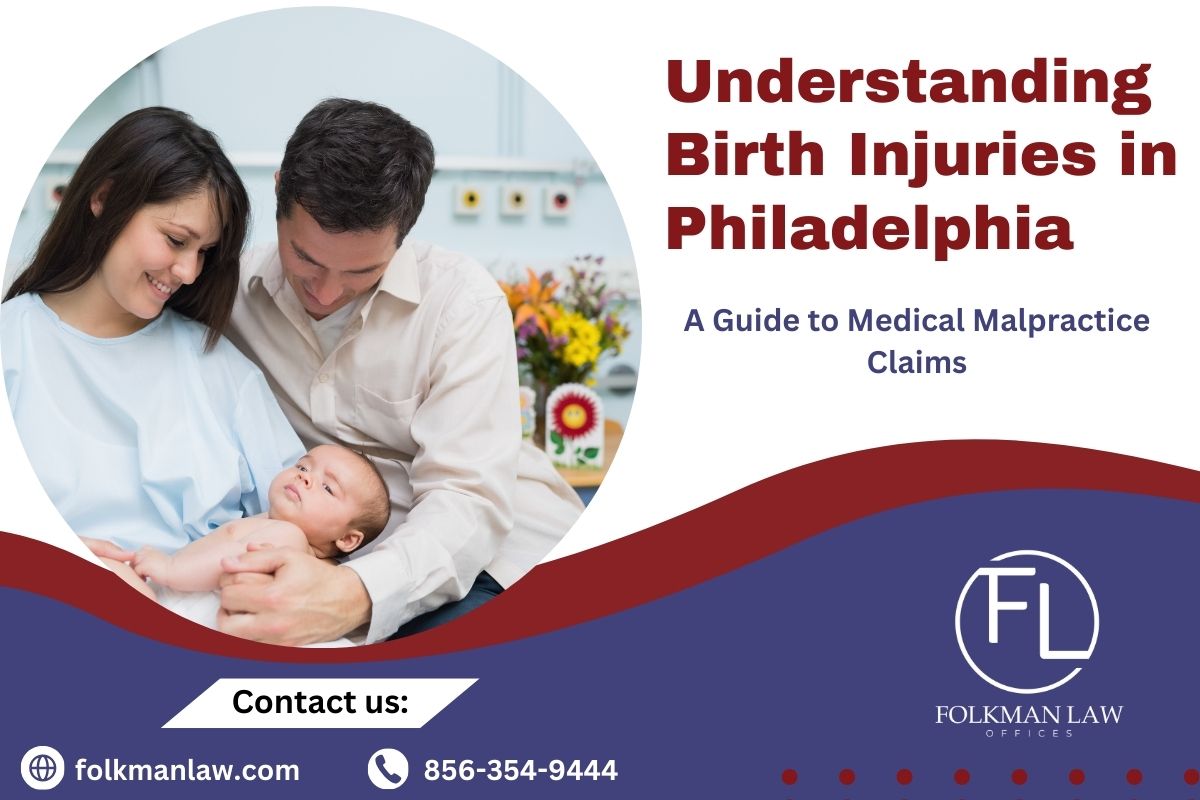Table of Contents
A Guide to Medical Malpractice Claims

When expecting a new addition to your family, you anticipate a happy and secure birthing experience. However, this is not always the case. Birth injuries are a type of medical trauma that can happen during the labor and delivery process. These injuries can occur due to complications during childbirth. It is important to know the risks, the frequency of such incidents, and the potential implications for your child.
- Birth injuries can range from mild to severe, with consequences including temporary harm or long-lasting disabilities.
- The types of birth injuries include, but are not limited to, brachial plexus injuries, cerebral palsy, bone fractures, and perinatal asphyxia.
- Some of these injuries can directly result from medical negligence or malpractice when healthcare professionals fail to adhere to the standard of care.
In Philadelphia, like in many large cities, the prevalence of birth injuries is a concerning matter. While precise statistics fluctuate each year, it is clear that not every birth goes as planned. When you look at the numbers, you’ll see that even with advanced medical practices, the rate of birth injuries is not negligible. Variability in the quality of care between different hospitals and healthcare systems in Philadelphia can also contribute to the likelihood of these unfortunate events.
Awareness of the prevalence of these injuries is the first step in understanding the importance of quality prenatal and delivery care. Should you or your loved one experience such an event, it is vital to recognize the potential for a medical malpractice claim. Knowing the local context of Philadelphia is crucial when navigating these complex and sensitive situations.
Differentiating Between Birth Injuries and Birth Defects
While you navigate the complex world of medical malpractice claims in Philadelphia, it’s crucial to understand the distinction between birth injuries and birth defects.
Birth injuries are typically associated with complications that occur during labor and delivery. These might involve:
- Physical trauma: For example, brachial plexus injuries from shoulder dystocia.
- Oxygen deprivation: This can lead to conditions like cerebral palsy.
- Inappropriate medical intervention, Such as excessive use of forceps or vacuum extractors.
In contrast, birth defects are generally conditions that develop during pregnancy, often due to:
- Genetic factors: Chromosomal abnormalities that might lead to conditions like Down syndrome.
- Environmental exposure: Harmful substances such as drugs, alcohol, or environmental toxins that can affect fetal development.
- Infection: Certain infections in the mother can lead to developmental issues in the fetus.
The central differentiator between the two is timing and causation. Birth injuries often occur as a result of something going wrong during the birth process itself, possibly due to medical negligence. However, birth defects usually arise from issues before birth, which may not be connected to the quality of medical care received.
When considering a medical malpractice claim in Philadelphia, it is crucial to determine whether your child’s condition is a birth injury or a defect. If you suspect medical negligence, it is important to conduct a comprehensive investigation with the help of legal and medical professionals. This will help you better understand the nature of your child’s injury or defect and guide you in appropriate legal action.
Common Types of Birth Injuries Associated with Medical Malpractice
When you’re preparing to welcome a new member into your family, you expect the healthcare providers in Philadelphia to ensure a safe delivery. However, sometimes, things can go awry, leading to birth injuries that may arise from medical malpractice. Here are the most commonly reported types.
- Brachial Plexus Injuries (BPI): Often occurring during a difficult birth, the brachial plexus nerves can be damaged. This can lead to conditions like Erb’s Palsy or Klumpke’s Palsy, manifesting as weakness or paralysis in the arm and hand.
- Cerebral Palsy: This persistent motor condition can affect body movement, muscle coordination, and posture. It may be caused by oxygen deprivation or a head injury during labor and delivery.
- Bone Fractures: Excessive force during delivery or the improper use of tools like forceps, can lead to fractures in the newborn’s clavicle or other bones.
- Perinatal Asphyxia: A severe injury resulting from the baby not receiving enough oxygen before, during, or just after birth can lead to various complications, including potential brain damage.
- Intracranial Hemorrhage or Subconjunctival Hemorrhage: Delicate blood vessels in a baby’s brain can rupture due to traumatic delivery. This can also result in visible red bands in the whites of the eyes.
- Caput Succedaneum and Cephalohematoma: These conditions involve swelling or bleeding underneath the cranium, often due to vacuum extraction or similar birthing aids.
- Facial Paralysis: Damage to facial nerves from pressure during birth can result in paralysis, which may or may not resolve independently.
If your newborn suffers from any of these injuries, and you believe below standard care was provided, you may have grounds for a medical malpractice lawsuit. Consulting with an experienced Philadelphia attorney at Folkman Law can clarify whether your situation qualifies as malpractice and help you take the necessary steps to pursue justice and compensation.
Identifying Medical Malpractice: Standards of Care in Obstetrics
When you are pregnant, the quality of care you receive from your healthcare providers is of utmost importance for your health and your baby. In obstetrics, it is essential to know what the accepted standards of care entail and when they have been violated to identify instances of medical malpractice.
In Philadelphia, as in most regions, obstetricians, nurses, midwives, and other healthcare professionals are expected to adhere to specific standards of care. These standards are set based on what a competent professional in the obstetrics field with a similar background would do under comparable circumstances.
Here are key factors that can help you identify whether a standard of care has potentially been breached in obstetrics:
- Timely and Accurate Diagnosis: Providers must diagnose and treat conditions such as preeclampsia, gestational diabetes, or infections on time.
- Monitoring Fetal Distress: It’s critical that healthcare professionals closely monitor the fetus for signs of distress and take appropriate measures if they arise.
- Appropriate Use of Delivery Tools: Using forceps or vacuum devices requires skill and precision to avoid injury.
- Adherence to Birth Protocols: There are established protocols for various birthing scenarios; deviation without valid reason might be malpractice.
- Effective Communication: Proper communication among the healthcare team and with you is essential for avoiding errors.
- Emergency Preparedness: In cases of sudden complications, readiness to perform emergency interventions like Cesarean sections is crucial.
If you suspect that you or your baby has been harmed as a result of a failure to meet medical care standards, you must seek advice from an accomplished lawyer who has experience with medical malpractice cases. They can evaluate your situation and assist you in pursuing the compensation you may be eligible for. Remember that demonstrating a violation of the standard of care is essential for a successful malpractice claim.
Statute of Limitations for Birth Injury Claims in Philadelphia


Suppose your child has suffered a birth injury in Philadelphia. In that case, you must know the statute of limitations, which determines the timeframe for filing a medical malpractice claim. You must consult a knowledgeable attorney at Folkman Law who is experienced in birth injury claims to understand fully how these laws apply to your case. Inaction or delay might lead to a forfeiture of your rights to seek justice and compensation for your child’s injuries.
Steps to Take if You Suspect a Birth Injury Due to Malpractice
If you suspect that a birth injury has occurred due to malpractice in Philadelphia, it’s essential to take immediate and informed steps to address the situation. Your actions can significantly influence the outcome of subsequent legal compensation claims.
- Seek a Second Medical Opinion
Obtain a comprehensive medical evaluation from a pediatrician or neonatologist not affiliated with the birth. This can help confirm a diagnosis and identify any injury potentially caused by malpractice. - Document Everything
Keep thorough records of all medical appointments, treatments, and recommendations. Note conversations with health professionals and save all communications and medical documents. - Understand the Statute of Limitations
Be aware of Pennsylvania’s statute of limitations for medical malpractice claims. Generally, you have up to two years from when the injury or reasonably should have been discovered. - Consult with a Birth Injury Lawyer
Contact an attorney knowledgeable in birth injuries and medical malpractice. They can offer legal advice, help you understand your rights, and outline the strengths and weaknesses of your case. - Preserve Evidence
Collect any potential evidence related to the birth injury, including medical records and witness statements. Do not alter anything that may be used in court. - Communicate Cautiously
Limit discussions about the suspected malpractice with others, especially on social media. Comments can be taken out of context and may affect the integrity of your claim. - Follow Your Lawyer’s Advice
Once you hire an attorney, follow their guidance on how to proceed. They may advise on additional steps, such as contacting the medical board or securing expert witnesses.
By taking these steps, you can establish a strong foundation for your malpractice claim and protect your rights and your child’s.
The Role of Medical Expert Witnesses in Birth Injury Litigation


When pursuing a birth injury litigation case in Philadelphia, you’ll quickly realize the indispensable role medical expert witnesses play. These professionals are crucial for substantiating your claim and clarifying complex medical issues to the court.
- First, medical expert witnesses provide authoritative opinions on whether the standard of care was met during the delivery process. They examine the actions of healthcare providers concerning the prevailing medical standards at the time of childbirth.
- Additionally, they shed light on the cause of the birth injury. It is their role to help establish a direct link between the healthcare provider’s actions (or inactions) and the injury sustained by your child. This causation is often the cornerstone of your claim.
- They also assist in demonstrating the nature and extent of the birth injury. A medical expert can explain the long-term implications of the injury on your child’s life, a critical factor in determining the damages in your case.
- Importantly, these witnesses help the jury understand medical terminology and procedures. They translate the medical jargon into layman’s terms, enabling jurors to make informed decisions based on clear understandings.
Choosing the right medical expert witness is crucial, as their credibility and talent can significantly impact the outcome of your case. In Philadelphia, the selected expert must have relevant practice or teaching experience related to your case’s type of birth injury. Furthermore, they must be actively practicing or familiar with the medical procedures or issues. The medical expert witness is a pivotal factor in your quest to obtain justice and compensation for a birth injury in a court of law.
Potential Damages and Compensation in Birth Injury Cases
When you are facing the aftermath of a birth injury, understanding the types of damages and compensation that may be available to you in Philadelphia is crucial. Birth injury cases can result in various compensation types, typically economic and non-economic damages.
Economic damages cover the financial aspects directly stemming from the injury, including but not limited to:
- Medical expenses, both past and future, related to the injury
- Costs of rehabilitation and therapy
- Expenses for special education or care necessitated by the injury
- Lost wages or loss of future earning capacity due to the child’s disability
Non-economic damages, although more difficult to quantify, are equally significant. They acknowledge the non-financial impact of a birth injury and may include:
- Pain and suffering experienced by the child and family
- Emotional distress and mental anguish
- Loss of enjoyment of life for the child
- Loss of consortium or companionship for the parents
In rare situations if the healthcare provider’s conduct was particularly egregious and intentional misconduct, you may also seek punitive damages. These are intended to punish the wrongdoer and deter similar conduct in the future.
It’s important to consult with a knowledgeable medical malpractice attorney at Folkman Law in Philadelphia who can provide a comprehensive assessment of your specific situation. They can help you understand what forms of compensation you may be entitled to and can guide you through the legal process to ensure your rights, and those of your child, are fully protected.
The Litigation Process: What to Expect During a Birth Injury Claim
When pursuing a birth injury claim in Philadelphia, you will embark on a complex legal journey that demands patience and attention to detail. Here’s what you should anticipate:
- Consultation with an Attorney: You’ll begin by consulting with a medical malpractice attorney who has experience with birth injury claims. They will review the details of your case to determine the viability of your claim.
- Investigation: Your attorney will launch a comprehensive investigation, gathering medical records, interviewing witnesses, and consulting with medical experts to build a strong foundation for your case.
- Filing the Lawsuit: Once your attorney has established a case, they will file a lawsuit. In Philadelphia, this involves submitting a Complaint against the healthcare providers and/or institutions you believe are responsible for the birth injury.
- Discovery Phase: During the discovery phase, both sides exchange information, documents, and evidence. You may be required to participate in depositions where you will answer questions under oath.
- Pretrial Motions: Before the trial, pretrial motions may be intended to resolve certain issues or potentially dismiss parts of the case.
- Settlement Negotiations: Birth injury claims are often settled out of court. Your attorney will negotiate with the defendants to reach a fair settlement agreement that compensates for your losses.
- Trial: Your case will go to trial if a settlement cannot be reached. You will present your evidence, and a judge or jury will determine liability and damages.
- Post-Trial: After reaching a verdict, the losing party may file an appeal, prolonging your claim’s resolution.
It’s important to adhere to the statute of limitations and work closely with your attorney to navigate the complexities of your birth injury claim.
Common Defenses Against Birth Injury Claims in Medical Malpractice Lawsuits
When you pursue a medical malpractice lawsuit for a birth injury, be prepared to encounter a variety of defenses from medical professionals and their legal teams. Understanding these common defenses can help you and your attorney strategize effectively:
- Standard of Care: The defense may argue that the medical provider adhered to the widely accepted standard of care within the medical community. To refute this, your legal team must demonstrate how the caregiver’s actions were not, in fact, in line with what a competent professional would have done under similar circumstances.
- Causation: A key defense challenges the link between the alleged negligence and the injury. They might assert that the birth injury was due to pre-existing conditions, genetic issues, or factors out of the providers’ control rather than a direct result of the caregiver’s action or inaction.
- Contributory Negligence: In some cases, the defense team might claim that your actions or the actions of the infant’s family contributed to the birth injury. This could involve failing to disclose medical history, not following prenatal care instructions or missing appointments.
- Informed Consent: If there is documentation that informed consent was provided, the defense might use it to argue that you were aware of the potential risks and complications associated with the procedure or treatment and agreed to proceed.
- Statute of Limitations: The defense could claim that the lawsuit was filed after the legal time limit for pursuing a birth injury claim, invalidating your lawsuit.
In cases where a birth injury has occurred due to medical malpractice, the defense may argue that the outcome was not entirely the fault of the medical professionals. In such cases, it is essential for your legal team to strategically dismantle these arguments with a combination of medical evidence, expert testimony, and a comprehensive knowledge of medical malpractice law. The primary objective is to demonstrate beyond doubt that the medical professionals failed to provide the standard of care, which led directly to the injury, and that the family’s actions did not substantially contribute to the outcome.
Impact of Birth Injuries on Families: Emotional and Financial Considerations


When your family is navigating the aftermath of a birth injury, you’re likely to encounter a range of complex emotions and financial burdens that can be overwhelming. Here’s what you need to be prepared for:
Emotional Impact
- Grief and Trauma: Learning that your child has suffered a birth injury can trigger profound grief. You might also experience post-traumatic stress disorder (PTSD), especially if the birth involved life-threatening complications or extensive medical intervention.
- Anxiety and Depression: The uncertainty about your child’s future health and abilities can lead to chronic anxiety or depression, affecting every member of your household.
- Relationship Strain: Couples often experience tension after a traumatic birth, with studies showing increased rates of separation and divorce in families of children with disabilities.
- Guilt: Parents may struggle with guilt, wrongly believing they could have done something to prevent the injury.
Financial Considerations
- Immediate Medical Costs: Initial expenses include hospital stays, surgeries, medication, and specialized care your infant might need immediately following a birth injury.
- Long-term Care Costs: Consider potential lifelong expenses for ongoing medical treatment, physical therapy, special education needs, and possibly personal care support.
- Loss of Income: A child’s serious health condition can sometimes necessitate that one parent reduce their working hours or leave their job altogether to become a full-time caregiver.
- Legal Costs: Should you decide to pursue a medical malpractice claim, there will be legal costs involved, although many attorneys in Philadelphia work on a contingency fee basis, where they get paid only if you win your case.
If you are considering filing a medical malpractice claim in Philadelphia, it’s important to understand the potential impacts. Pursuing justice can not only provide financial relief, but also bring a sense of closure and validation for the harm that was suffered. However, seeking the guidance of experienced local attorneys who can handle these sensitive matters with care and effectiveness is essential.
How to Choose the Right Attorney for Your Birth Injury Case in Philadelphia
Choosing the right attorney for your birth injury case is critical in ensuring that you receive proper representation and your rights are fully protected in Philadelphia. Here are key steps to selecting an attorney to serve your needs best:
- Research Attorneys with Birth Injury Experience: Look for law firms knowledgeable in birth injury or medical malpractice cases. Experience in this field is paramount as these cases can be complex and require in-depth medical and legal knowledge.
- Check Track Record and Reputation: Investigate the attorney’s history in handling birth injury cases. For example, Folkman Law has a proven track record of successful client outcomes. Read reviews, ask for references, and check peer ratings to gauge reputation and reliability.
- Assess Resources and Team Talent: Efficient handling of a birth injury claim requires access to medical experts and a team with diverse talents. Folkman Law has the necessary resources and network of professionals to strengthen your case.
- Evaluate Communication and Comfort Level: Your attorney should communicate without excessive legal jargon, making complex litigation more understandable. Additionally, it’s pivotal that you feel comfortable with your legal team. Folkman Law prioritizes client communication and comfort, ensuring you’re informed and at ease every step of the way.
- Consider the Financial Aspect: Understanding the fee structure is crucial. Folkman Law operates on a contingency fee basis for birth injury cases, meaning you pay no fees unless they recover compensation for you.
When you choose Folkman Law, you partner with a dedicated team that advocates for you and your child’s well-being.
Empowering Parents through Knowledge and Legal Resources
As a parent dealing with the aftermath of a birth injury in Philadelphia, it can be overwhelming to navigate the situation. However, you are not alone, and resources are available to help you. It is important to educate yourself about the complexities of medical malpractice concerning birth injuries. Gain an understanding of the medical standards of care and learn to recognize when these standards have been breached. This knowledge can help you make informed decisions and take appropriate action to protect your child’s health and well-being.
- Stay informed about your child’s medical condition and potential implications for the future.
- Research reputable sources and organizations focused on birth injuries and medical malpractice.
It’s critical to become familiar with your legal rights and the statutes of limitation for filing a malpractice claim in Pennsylvania. Consult with Folkman Law’s experienced legal professionals knowledgeable in birth injury cases. They can offer you:
- A comprehensive evaluation of your case.
- Guidance through the complexities of medical malpractice law.
- Representation in negotiations with healthcare providers and insurance companies.
- Legal advocacy in court, if it comes to a trial.
Remember that every birth injury case is unique and warrants a personalized approach. A lawyer can help by ensuring all pertinent information is considered and the responsible parties are held accountable.
“An informed parent is a powerful advocate for their child.”
This adage underscores the importance of being proactive and continuously seeking knowledge. Empower yourself through education and legal assistance. By doing so, you will be well-positioned to make informed decisions regarding your child’s welfare and seek justice through the appropriate legal channels. Remember, upholding your child’s rights and ensuring they have the necessary support can significantly influence their quality of life.
FAQ’s
Q: What are the common signs of a birth injury, and when should I be concerned?
A: Common signs of birth injuries may include difficulty moving limbs, abnormal muscle tone, seizures, and developmental delays. If you notice any unusual symptoms or if your child’s development seems delayed, it’s crucial to consult with a healthcare professional for a thorough evaluation.
Q: How can I differentiate between a birth injury and a birth defect?
A: Birth injuries typically result from complications during labor and delivery, while birth defects arise from issues before birth, such as genetic factors or environmental exposures. If you suspect medical negligence, consulting with legal and medical professionals is important to determine the cause and potential grounds for a medical malpractice claim.
Q: What steps should I take if I suspect a birth injury due to medical malpractice in Philadelphia?
A: If you suspect a birth injury, seek a second medical opinion, document everything related to the injury, understand the statute of limitations in Pennsylvania, consult with a birth injury lawyer, preserve evidence, and follow your lawyer’s advice. Taking these steps promptly can strengthen your case and protect your rights.
Q: How long do I have to file a medical malpractice claim for a birth injury in Philadelphia?
A: In Pennsylvania, including Philadelphia, the standard statute of limitations for filing a birth injury lawsuit is two years from the date the injury is discovered. In certain cases, birth injuries may not be apparent for an extended period, allowing the discovery rule to extend the statute of limitations. The countdown begins on their 18th birthday, extending the time limit to file a claim until their 20th birthday. It’s crucial to consult with an attorney to understand how these laws apply to your specific case.
Q: What damages can I seek in a birth injury case, and how is compensation determined?
A: In a birth injury case, you can seek economic damages for medical expenses, rehabilitation costs, special education needs, and lost wages. Non-economic damages may include pain and suffering, emotional distress, and loss of enjoyment of life. Compensation is determined based on the case’s specific circumstances and the injury’s impact on the child and the family. Consulting with an experienced attorney can help assess the potential damages in your case.



